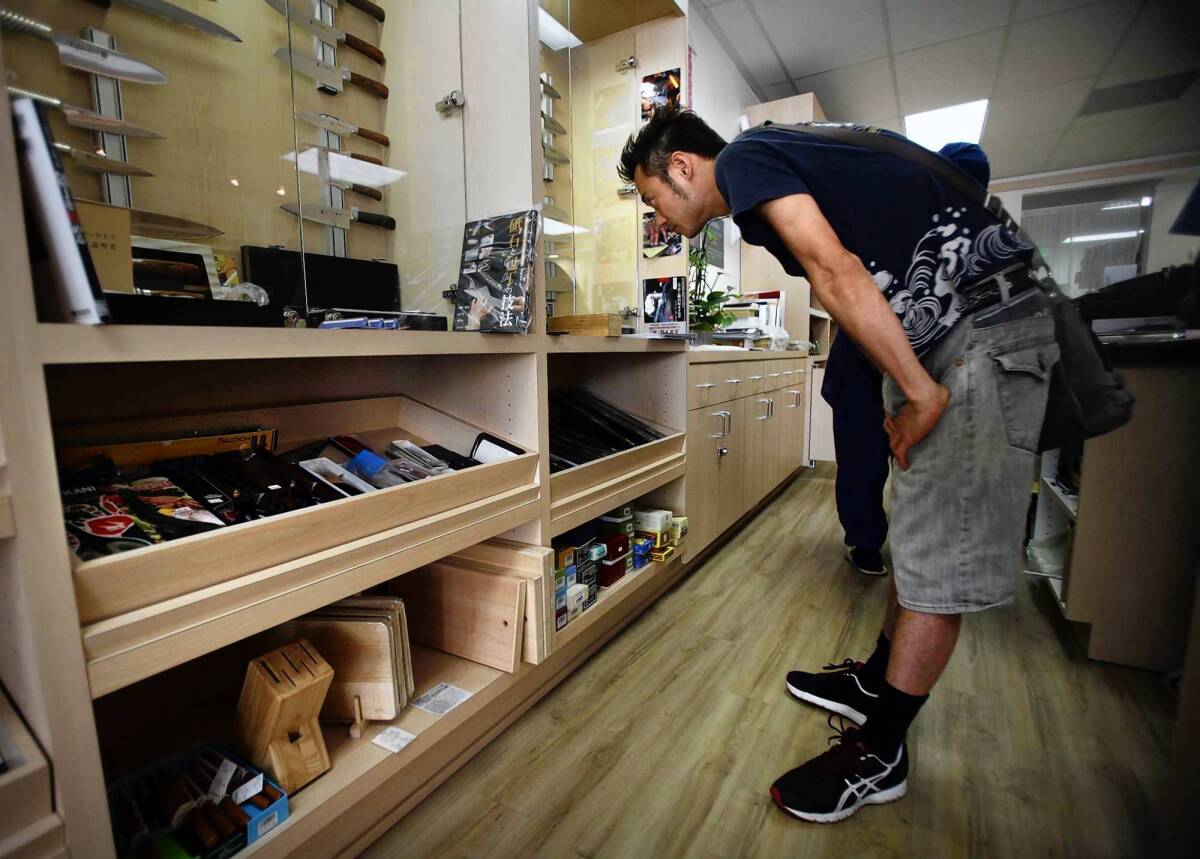Hitachiya in Torrance offers specialty Japanese cookware

- Share via
“What’s this?” I ask the proprietor of Hitachiya, a Japanese cookware store in Torrance. I couldn’t imagine how such a crude metal spike could possibly be used in the kitchen.
“For nailing an eel to a board.” I shudder, remembering the one time I dealt with a still-wriggling eel.
“And this?” I wonder, examining a hinged wire mesh basket with handle.
“For roasting ginkgo nuts.”
I’d made a trip to Hitachiya to buy a Japanese-made hand-hammered steel wok recommended by my friend Sonoko Sakai. Also to have two of my Japanese knives sharpened. I ended up spending a good hour exploring all the unfamiliar specialized cooking implements arranged on the shelves of the small, neat shop in Rolling Hills Plaza.
Despite the shop’s semi-hidden location, chefs both Japanese and Western are finding their way to the store for specialized cookware they can’t find elsewhere. Manhattan has Korin, where chefs can talk knives. Southern California now has Hitachiya.
Owner Hirota Masazumi, a blue-and-white printed scarf wrapped around his head, introduced himself and showed me how the special ceramic vessel for roasting sesame seeds works. “You put the sesame in the top, and pour the roasted seeds out here,” he explained. Sold.
I lifted down from a shelf a round wood rice box with copper hoops and opened the lid, breathing in the intensely woodsy fragrance. The box is used to serve rice and the wood also removes excess humidity from the grains of rice. I wanted it but didn’t need it. (At least right now, I told myself.)
But he has the same shopping baskets I’ve seen Sonoko carry at the farmers market. Handwoven bamboo, they’re sturdy enough to last a lifetime: Sonoko’s is at least 20 years old. Actually, Masazumi tells me, Americans are buying them to carry computer and camera equipment.
Hanging on the wall is what looks like a very loosely woven unfinished basket. It’s for steaming fish. You place the fish in it and then lower it into a pot. That way when it’s cooked, you can easily lift the fish out without it falling apart.
As soon as I spotted a tiny bamboo brush for getting the ginger out of a fine-toothed copper ginger grater, I added it to my growing stash of cookware at the cash register. Masazumi had something else to show me: From a box on a high shelf, he took out a paddle-shaped implement covered in white sharkskin: for grating fresh wasabi. Swoon. I’m always floored by the elegance and craftsmanship of Japanese everyday objects.
Further on, I found ingenious little iron grill pans, with removable handles, the better to store in small places. They’re from Nambu, the same area that makes the more familiar black iron teapots. An iron skillet that seasons really well and comes in many sizes. How could I resist? His prices are very good. A giant suribachi and wooden pestle made from a sancho pepper tree branch. And a heavy copper tempura pot lined with tin for frying.
As I circled the store, I came across a blurry, black-and-white photograph of motorcycle and rider next to a sign that reads, “Welcome to Nebraska.” That’s the shop’s owner way back in 1970. A member ofJapan’sbad boy motorcycle group Thunder Tribe, the young Masazumi took off after university for a yearlong ride around the world. He came across the Pacific on a cargo boat, landing with his Yamaha 650cc in San Francisco. Freedom! The open road! The drive down the coast inspired a longing to live in balmy Southern California. It’s taken him nearly half a century, but he finally made it back (this time, without the moto).
After working for years at his father’s cookware store at Tsukiji, Masazumi, now 64, started living his California dream when he opened in September. For chefs and the serious home cook, the shop is a treasure of high-quality cookware and tools for Japanese and other cooking.
Of course, there are also the so-popular Japanese kitchen knives. Masazumi carries several lines, most from Sakai near Osaka. And, most important, he’ll sharpen Japanese knives, starting at $10. For cleaning cutting boards and knives, he suggests a simple loofah, also for sale here.
And that motorcycle of his youth? Now he keeps a Harley in Japan. He rides it when he goes back on buying trips every three months. Meanwhile, here, he practices the jazz cornet in the mornings and likes to tap dance, he says, showing off a few steps.
Hitachiya, Rolling Hills Plaza (near BevMo), 2509 W. Pacific Coast Highway, Torrance, (310) 534-3136, https://www.hitachiya-usa.com. Open seven days a week.
More to Read
Eat your way across L.A.
Get our weekly Tasting Notes newsletter for reviews, news and more.
You may occasionally receive promotional content from the Los Angeles Times.










